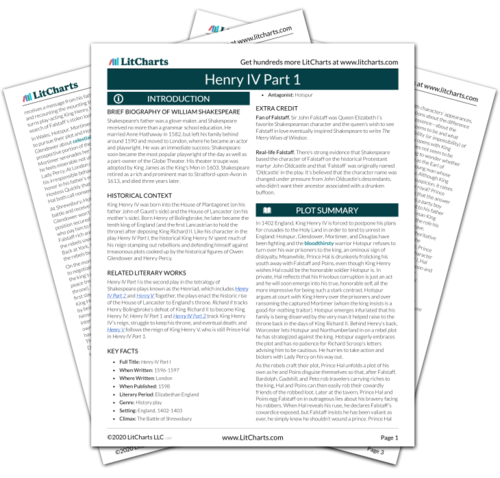
However, as usual, Falstaff not only survives the ordeal of being derided as a coward and liar but emerges (as he usually does) triumphant. Then, aided by Welsh and Scottish forces, the latter led by Douglas, they plan war against King Henry IV.Īt the Boar’s Inn, the robbery and the duping of Falstaff is winding up riotously.

They will make peace with Glendower and gain his support and that of the captured Mortimer. The Percys, deeply resenting the fact that the man they helped to the throne now intends to enforce absolute obedience, begin to plot their revolt. Meanwhile, back at court, King Henry confronts the Percy family (Hotspur, his father Northumberland, and his uncle Worcester) over their not turning prisoners of war over to the crown. Alone, Prince Hal soliloquizes, letting the audience know that, although he now chooses to enjoy himself in riotous company, he has no illusions about the character of his associates and will redeem himself publicly at the proper time. Prince Hal, as Prince Henry is appropriately called in this setting, joins with Poins, Bardolph, and Peto in a plan to gull Falstaff, contriving to have him participate in a robbery at Gadshill, be robbed in turn, and finally exposed as a coward and liar. Yet Hotspur’s show of valor especially gives the harassed king reason to lament the dereliction of his own son and heir, Prince Henry, a mirror image of Hotspur, who has avoided the court and public responsibility and spends his time in the company of the elderly, high-spirited Sir John Falstaff, as well as the lowly gang of hangers-on at the Boar’s Head Tavern in Eastcheap. But there is one piece of good news: English forces, led by young Hotspur have defeated the Scots at Holmedon and have captured the renowned Earl of Douglas. Thus, he laments that he is unable to fulfill his earlier vow to lead a crusade to the Holy Land to do penance for his part in the death of Richard II. He is a ruler beset with troubles: civil strife in England, attacks by Scottish forces moving across the northern border, and the defeat and capture of his loyal Mortimer by the Scottish warrior, Glendower. All Rights Reserved.Taking up where Shakespeare’s Richard II leaves off, Henry IV Part 1, finds Bolingbroke, now King Henry IV, tenuously ruling England, as a man who usurped the throne and is not ordained of God. In the words of Machiavelli: "experience shows us that in our times the rulers who have done great things are those who have set little store by keeping their word, being skillful rather in cunningly confusing men" ( The Prince). This passage foretells how successful Hal will be when he obtains the throne. His association with the likes of Falstaff allows him a connection to the common people that will be vital during his reign as Henry V. His mischievous behaviour is merely part of a political maneuver to look as good as possible when he does finally gain power. Hal has every intention of leaving behind his life of wine and petty theft. Here Prince Hal reveals his plan to achieve popularity amongst the people he knows he will one day rule. Than that which hath no foil to set it off.


Shall show more goodly, and attract more eyes, My reformation, glittering o'er my fault, Shakespeare's Reputation in Elizabethan EnglandĪnd like bright metal on a sullen ground, Shakespeare's History Plays: The Ultimate Quiz Next: Henry IV Part 1, List of Charactersġ Henry IV Overview (with theme analysis)ġ Henry IV Study Questions with Sample Answers Please see the bottom of each scene for extensive explanatory notes.

Please see the bottom of this page for helpful Henry IV resources. Scenes from Shakespeare's Henry IV Part 1


 0 kommentar(er)
0 kommentar(er)
